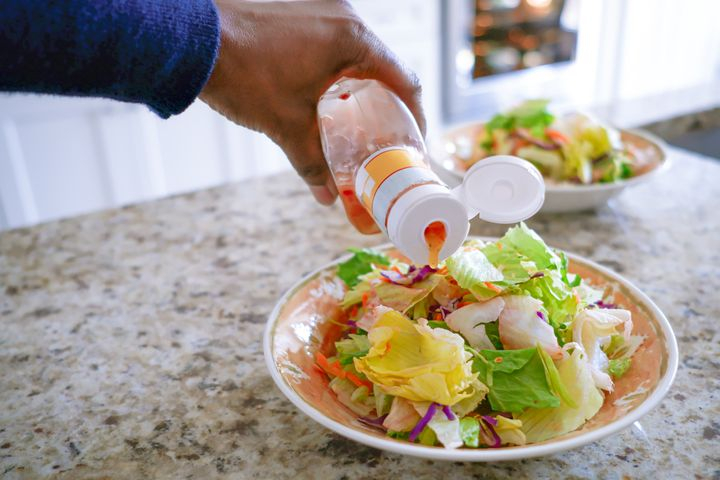Choosing Healthier Salad Dressings: Avocado Oil or Olive Oil?
Looking to make healthier choices when it comes to salad dressings? Look no further. When it comes to creamy dressings, the type of oil used makes all the difference. While they tend to be higher in saturated fat, some oils are better for you than others. When scanning the labels of store-bought dressings, be on the lookout for ingredients like palm oil, sugar (sometimes hidden under other names), salt, monosodium glutamate (MSG), and coconut oil. These can be high in saturated fat, and excessive consumption of sugar and salt can have negative health effects. MSG, in particular, has been linked to inflammation and other health issues. So, what oils should you be seeking out? Look for dressings made with healthier alternatives like avocado oil or olive oil. These oils are better for your overall health and provide a delicious flavor. If you’re feeling adventurous, try using fresh herbs as an alternative for flavor enhancement. Remember, moderation is key, and it’s okay to enjoy dressings that may not be the healthiest.
Healthier Salad Dressings
When it comes to salad dressings, choosing healthier options can make a big difference in your overall diet. Creamy dressings tend to be higher in saturated fat than oily dressings, but it really depends on the type of oil used. Let’s take a closer look at the different factors to consider when selecting a healthier salad dressing.
Creamy vs Oily Dressings
Creamy dressings often have a rich and indulgent flavor, but they can also be laden with unhealthy fats. The saturated fat content in creamy dressings can vary depending on the ingredients used. If you’re looking for a healthier option, it’s a good idea to choose dressings that use avocado oil or olive oil as their base. These oils contain healthier fats and can provide a creamy texture without the excess saturated fat.
On the other hand, oily dressings tend to be lower in saturated fat, but it’s still important to be mindful of the type of oil used. Some oils, like canola oil or sesame oil, are healthier choices and can add a pleasant flavor to your salad.
Avoiding Unhealthy Ingredients
There are certain ingredients that you should watch out for when selecting a healthier salad dressing. These ingredients can negatively impact your health and should be avoided or consumed in moderation.
One such ingredient is palm oil. Palm oil is high in saturated fat and can contribute to unhealthy cholesterol levels. It’s important to check the ingredient list and opt for dressings that do not contain palm oil.
Sugar and salt are also common culprits in unhealthy salad dressings. These ingredients are often listed under other names, so it’s essential to read the ingredient list carefully. Choose dressings with little to no added sugar and opt for reduced-sodium options.
Another ingredient to avoid is monosodium glutamate (MSG). MSG is a flavor enhancer that can cause inflammation and other negative health effects in some individuals. Look for salad dressings that do not contain MSG or any other artificial additives.
Coconut oil is another ingredient to be mindful of. While it can provide a unique flavor to dressings, it is high in saturated fat. Moderation is key when it comes to consuming coconut oil, so consider using it sparingly or opting for healthier oil alternatives.
Importance of Reading Nutrition Labels
When selecting a healthier salad dressing, it’s important to read the nutrition label. Understanding the ingredients list and checking the nutritional content can help you make an informed decision about what you’re putting on your salad.
The ingredients list is a great place to start. Look for dressings that have a short and simple ingredient list, avoiding any artificial additives or unhealthy fats. Choosing dressings with natural ingredients will not only be healthier but also tastier.
Checking the nutritional content is also crucial. Pay attention to the serving size and the amount of calories, fat, and sodium per serving. Aim for dressings that have lower calorie and fat content while still providing enough flavor to enhance your salad.

Alternative Flavor Enhancers
If you’re looking to add more flavor to your salad without relying on store-bought dressings, there are several alternative options to consider. Fresh herbs are a great way to enhance the taste of your salad without adding extra calories or unhealthy ingredients. Basil, cilantro, parsley, and mint are just a few examples of herbs that can add a burst of freshness to your salad.
Exploring different spices is another fantastic way to elevate the flavor of your salad. Spices like cumin, paprika, turmeric, and chili powder can add depth and complexity to your dressing. Get creative and experiment with different spice combinations to create a dressing that suits your taste preferences.

Moderation is Key
While it’s important to prioritize healthier salad dressings, it’s also essential to find a balance between health and enjoyment. Indulging in a less healthy dressing from time to time is perfectly okay as long as it’s done in moderation.
Remember, the key is to make overall healthy food choices and maintain a well-balanced diet. Adding a small amount of a rich and creamy dressing occasionally can be a treat for your taste buds without derailing your healthy eating plan.
In conclusion, choosing healthier salad dressings involves considering factors such as the saturated fat content, the type of oil used, and avoiding unhealthy ingredients. Reading nutrition labels, exploring alternative flavor enhancers, and practicing moderation when it comes to indulgent dressings are all key components in maintaining a healthier diet. So, next time you reach for a salad dressing, be mindful of your choices and opt for ingredients that will nourish your body while still adding deliciousness to your salad.


